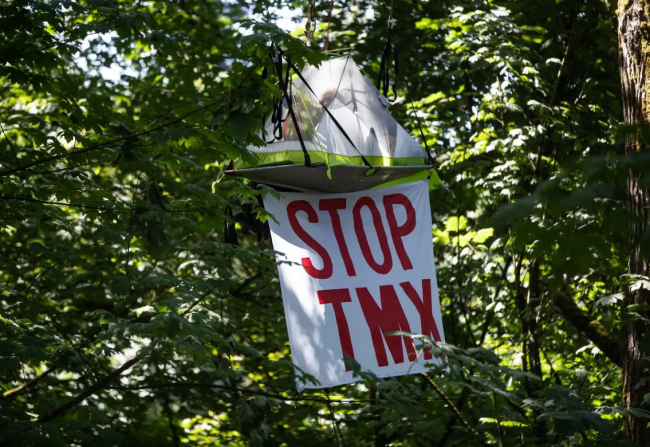Articles Menu

June 10, 2022
Next week, Dr. Tim Takaro, a distinguished authority on public health, will have his sentencing hearing after pleading guilty to criminal contempt for violating a court-ordered injunction against blocking the Trans Mountain pipeline expansion (TMX).
His potential four-week sentence, longer than those of most of the other 250 protesters charged under the 2018 injunction, reflects Takaro’s leading role in opposition to the new fossil fuel infrastructure. It also reflects the absurd predicament Canada now finds itself in, as we begin to take halting steps toward decarbonization without altering the fundamentals of an economy dependent on oil and gas. The absurdity is all the more evident when one looks at the nature of Takaro and his crime.
Takaro is an expert on the public health impacts of climate change. He earned a medical degree and a master of public health from the University of North Carolina. He then taught at the University of Washington, and picked up another master’s degree in toxicology before moving to Canada in 2005 to join Simon Fraser University’s Faculty of Health Sciences. Here, he also taught students at UBC’s School of Medicine and maintained a clinical practice at Vancouver General Hospital. He has published over 100 peer-reviewed papers, and was active in the International Physicians for the Prevention of Nuclear War when it won the Nobel Peace Prize in 1985.
The review refused to consider Takaro’s first report, as the Harper government excluded climate impacts from its terms of reference, and the final report did not address his toxicity work. Troubled by these gaps, the Health Officers’ Council of BC called on the province in 2019 to order an independent review of the cumulative health impacts — a request that has been ignored.
By the summer of 2020, Takaro was exasperated with the system. The highest courts had rejected the final challenges by First Nations, and media attention had shifted to another public menace, COVID-19. Most people would have gone on vacation; Takaro used a sabbatical to climb a tall tree that would soon be cut down for the pipeline. An experienced climber, he rigged a platform 30 metres up with a banner that could be seen from cars on Highway 1. “I had to choose between the importance of the court-ordered injunction versus the importance of preserving the planet and the public’s health,” he said in a statement to the court.
It was about this time that I first heard of him. As someone who joined previous pipeline protests, I was glad somebody was taking a stand on an issue that governments and media seemed intent on burying. Opposition to the pipeline remained strong, not least from three local First Nations, the City of Vancouver and neighbouring municipalities. Still, public protests had died down, and construction of the pipeline was shifting into high gear. To my mind, Takaro’s tree-sit seemed both valiant and hopeless.
However, the tree-sit attracted others: fellow scientists who took turns on the platform for weeks at a time, and groups who publicized the blockade. It wasn’t fun and games. The winters of 2020 and 2021 were cold and wet, and the company cut down nearby trees, endangering protesters. In February, Takaro was arrested by armed RCMP officers dressed in fatigues.
Critics will say he deserves to be punished for breaking the law and blocking a project of national interest. Expert observers, however, including the parliamentary budget officer, have questioned the business case for TMX and its ballooning cost — now pegged at $21 billion, up from the Trudeau government’s original quote of $4.2 billion. And given the effects of the latest windstorms in Ontario and last year’s flooding and heat-dome in B.C. — the latter took the lives of over 600 British Columbians, the provincial coroner reported this week — one might ask whose interests this project is serving.
Presenting a UN report in April that warned of the impending climate emergency, Secretary-General António Guterres said “Climate activists are sometimes depicted as dangerous radicals. But, the truly dangerous radicals are the countries that are increasing the production of fossil fuels.”
Correction — June 10, 2022: This column was edited to correct that Dr. Tim Takaro has pled guilty. A previous version misstated that he was going to trial, when in fact it is a sentencing hearing.